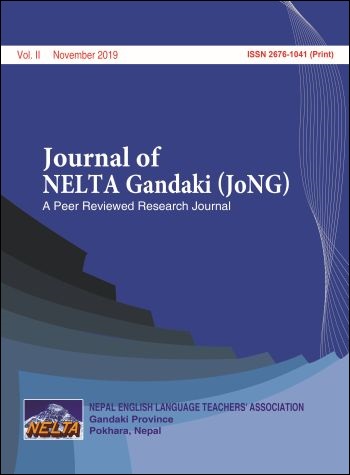Postmethod Pedagogy in Teaching English as a Foreign Language: Students' Perceptions
DOI:
https://doi.org/10.3126/jong.v2i0.26606Keywords:
context-sensitivity, particularity, possibility, practicalityAbstract
The study deals with the background context of postmethod pedagogy (PMP henceforth), a context-sensitive and critically practical pedagogy, differentiating it from the traditional concept of teaching by adhering strictly to a particular method of teaching a foreign language (the English language here) with reference to Nepal. It aims to explore the perception and inclination of M. Phil. pursuing students towards PMP in EFL teaching in Nepal. Google form of a questionnaire consisting of closed-ended items was used to collect data from 81 (of whom 65replied) M. Phil. pursuing (in English Education) scholars from Nepal Open University and Tribhuvan University. It revealed the gradual shift of ELT practitioners of Nepal from method-based instruction to PMP along with the intents of parameters of PMP, called pedagogy of particularity that advocates context-sensitivity in teaching and learning, pedagogy of practicality that insists for practicality and teacher-generated theories (theory of practice), and pedagogy of possibility that elicits the critical consciousness of the practitioners in terms of their socio-cultural context with adequate illustration. It was found that M. Phil. pursuing students had a positive attitude and supportive perception towards PMP leading to local and contextual superiority in pedagogy over the afforded methods although the local may be the hybrid of many foreign methods leading to an eclectic method.
Downloads
Downloads
Published
How to Cite
Issue
Section
License
This license allows reusers to distribute, remix, adapt, and build upon the material in any medium or format for noncommercial purposes only, and only so long as attribution is given to the creator.




